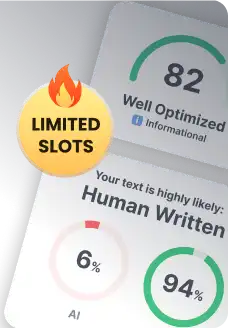In the competitive landscape of content creation, staying ahead of the curve is essential. AI is no longer a futuristic fantasy; it’s a game-changer that can give you a serious edge. But to truly leverage its potential, you need a strategic approach to creating AI content. This means understanding its limitations, embracing its strengths, and using it responsibly to elevate your overall content strategy.
Key Takeaways
- AI-generated content is an example of the intersection between innovation and creativity, creating text, images, and other media at scale and with unique customization. Its potential to automate creative content production processes is already changing the way businesses connect with their audiences.
- AI is a game changer when it comes to content creation and implementation. It handles the busy work, allowing human creators to focus on the more strategic and imaginative tasks. This saves time and lowers operational costs.
- Additionally, the use of AI increases the capacity to create large quantities of content in a variety of formats and platforms – all with quality and accuracy at scale. This level of scalability also helps businesses to stay on brand and message, yet still respond to changes in the market.
- AI is incredible at analyzing user data and serving up the most relevant, personalized content experiences. This all leads to richer customer experiences and increases marketing efficiency and impact. Leveraging AI for personalization is essential for creating deep, memorable customer relationships.
- AI content has many benefits, but it just can’t capture human creativity and emotional depth. This underscores the obvious and critical need for human oversight. Striking this balance of AI and human acumen helps our content feel personal while still extending its reach and impact.
- Emerging trends in AI, such as multi-modal content production and human-AI collaboration, point to a future where AI complements human creativity. Continuously engaging with these innovations will be essential to any organization’s ability to stay one step ahead of the competition.
What Is AI-Generated Content
Definition of AI Content
AI-generated content uses technology to produce text, images, or other multimedia that closely resembles human-created work. Think of it as a highly intelligent digital assistant capable of producing unique content through AI algorithms. This process, powered by natural language generation, allows for the creation of content that feels remarkably human-like.
Consider how a chatbot might read a paragraph that seems to originate from an actual person. This capability highlights the vital role of AI tools in content creation, enabling the production of richer, more relevant, and immersive material without constantly reinventing the wheel.
AI systems primarily employ machine learning algorithms, natural language processing, and deep learning techniques to achieve this. These systems continue learning from vast amounts of data and human-developed prompts by people.
However, the process is not always straightforward. The quality of the data fed into the AI significantly influences the output, and biases or errors in the data can lead to flawed results.
While AI can accelerate and support various aspects of the content workflow, human creativity and judgment remain crucial for achieving optimal outcomes. AI serves as an enhancement tool, improving our capabilities rather than replacing human input.
Importance in Modern Content Creation
In today’s fast-paced environment, the demand for fresh content is ever-present. AI-generated content offers a solution by automating content creation, either fully or partially, across various platforms, including social media. This automation enables faster and more efficient content production.
Imagine a future where most marketers rely on AI for key content functions. AI plays a crucial role by analyzing data and trends, helping to create content that is not only new but also timely and topical. It’s akin to having a continuous focus group that provides insights into current discussions and trends.
For companies, this represents a significant competitive advantage. Embracing AI enables them to transform their content strategies, producing higher-quality, more consistent content at greater speed and tailoring it to their audience’s specific needs.
This process can include creating in-depth blog posts, writing Facebook ad copy, or summarizing social media conversations. Therefore, it is essential to carefully review and refine AI-generated content.
This step ensures accuracy and allows for the correction of any errors that AI might overlook. Additionally, according to the U.S. Copyright Office, meaningful human contribution is necessary to obtain copyright protection, a critical consideration for safeguarding your work.
Benefits of AI in Content Creation
In the competitive digital landscape, AI empowers content creators to achieve more with less. Its primary benefits include time savings and improved quality, which enhance audience engagement—a key goal for content teams aiming to follow industry best practices.
AI tools have significantly increased workflow efficiency, allowing creators to focus on strategic endeavors rather than tactical ones. These technologies also enable scalable content production while maintaining uniformity and brand integrity across multiple platforms.
1. Boosting Productivity and Efficiency
AI technologies excel at maximizing productivity by saving time and enabling creative minds to work more effectively. Here’s how AI enhances productivity:
- Automated content generation
- Grammar checks and content enhancement
- Data analysis for audience insights
- Task automation for content distribution
By automating repetitive tasks, AI enables teams to produce initial drafts much faster, significantly reducing the time spent on the early stages of content creation. This efficiency allows human creators to concentrate on more strategic and creative aspects of their work, fostering greater creativity and deeper connections with their audience.
2. Scaling Content Production with Quality
AI enables businesses to produce large volumes of high-quality content by managing and streamlining content across various channels. It ensures the resulting content aligns with the desired tone and writing style, which is crucial for maintaining brand identity and building trust.
AI algorithms can offer personalized writing suggestions to enhance writing quality, such as avoiding overly formal language or adding a conversational tone. This helps maintain a consistent brand voice across all content, regardless of the volume produced.
3. Enhancing Personalization and Targeting
Want to try SurgeGraph for free?

Generate 20 documents

SEO tools (Auto Optimizer, Internal Linking, and more)

No credit card required
Personalization is vital for a successful content strategy, and AI tools are particularly effective in this area. They facilitate:
- Dynamic content recommendations
- User-specific content delivery
- Tailored communication strategies
AI can analyze vast amounts of user data to recommend personalized content journeys, identify behavior patterns, and determine content preferences using engagement data and user feedback.
This level of personalization significantly boosts customer engagement by delivering content that aligns with each user’s interests, fostering deeper and more meaningful brand interactions.
4. Saving Costs and Time
Utilizing AI for content creation offers substantial cost-saving advantages. By automating processes typically performed by large teams, companies can reduce expenses related to hiring and training. Automated content generation enhances productivity, enabling a more agile content strategy that can quickly adapt to market trends and cultural shifts.
Limitations of AI-Generated Content
While AI offers unparalleled efficiency and scalability in content creation, it also presents several challenges. Relying solely on AI can compromise quality and authenticity. AI-generated content may sound robotic, potentially leading to customers feeling awkward or even distrustful of a business.
It often lacks the emotional nuance and human element that make content compelling. This section explores these challenges and emphasizes the importance of human oversight and creativity in addressing them.
Absence of Human Creativity
AI struggles to replicate authentic human creativity. AI-generated content often relies on templates or formulas, which can cause content to lack originality, depth, and detail—qualities inherent in human writing. This can make the content less engaging and less effective in capturing attention.
AI may also fail to convey the emotional impact of statistics or elicit empathy from the reader. The emotional depth and nuance that make creative work resonate.
Their usual lack of presence has underscored just how essential public engagement is for these processes to be successful. Human creativity provides the spark that makes content truly connect with an audience.
Potential for Errors and Inaccuracies
AI-generated content isn’t foolproof, and mistakes can lead to major repercussions, particularly in business-critical subjects. Common issues include:
- Misinterpretation of context
- Incorrect data or outdated information
- Grammatical errors or awkward phrasing
- Lack of clarity in complex subjects
Inaccuracies in AI-generated content can damage a brand’s credibility and erode customer trust. Therefore, proofreading and editing AI outputs are essential practices for ensuring high-quality results.
The quality of AI-generated content depends on the data it is trained on, and content that is poorly written or factually inaccurate can be detrimental. Regular human review helps maintain the accuracy, relevance, and safety of AI-generated content.
Maintaining Consistency and Brand Voice
Consistency in brand voice is crucial, but AI often struggles to maintain it. That’s because it often produces stilted, awkward language.
Businesses must implement strict guidelines for using AI tools to ensure they adhere to brand standards. Establishing voice, style, and core messaging pillars helps keep AI-generated content on-brand. By adopting these standards, companies can ensure consistent, on-brand communications and maximize AI’s potential.
Challenges with Complex Subject Matter
AI frequently falters when dealing with nuanced topics that require deep human knowledge. Areas where AI may struggle include:
- Nuanced legal documentation
- In-depth scientific research
- Cultural or historical analysis
- Detailed financial reports
Expert knowledge is essential for maintaining accuracy, depth, and understanding in niche content areas. Context and detail are crucial when discussing complex subjects, and human oversight is necessary to ensure these elements are not overlooked.
AI-generated content does not adapt well to new information or frequent changes, making it less useful and reliable over time. Combining AI efficiency with human expertise promotes a stronger content-generation process.
Future Trends in AI Content Creation
Want to try SurgeGraph for free?

Generate 20 documents

SEO tools (Auto Optimizer, Internal Linking, and more)

No credit card required
We are at the forefront of a transformative era in AI content creation, with exciting trends emerging that are reshaping how we interact with content. These trends include:
- AI’s potential to produce increasingly sophisticated text, audio, and visual content with greater accuracy and detail.
- The future of storytelling with AI provides more flexible and engaging stories.
- The development of AI-generated content tools, quickly making it indispensable for creators to make the most out of their content.
- AI algorithms get it right every time on what content to serve by analyzing user data.
- The development of AI tools, which are about to fundamentally reshape the creator’s economy.
- The growing ability of AI to create personalized music and visuals for different channels.
These trends will revolutionize content marketing, making content creation easier, more efficient, and capable of delivering customized experiences that connect with audiences. The nature of AI is rapidly evolving, and content marketers must stay informed and agile to leverage these tools effectively.
AI-assisted content is dramatically altering how we consume information, making it imperative to keep pace with this development.
Multi-modal Content Production
Multi-modal content production involves combining various content types—text, audio, visuals—into a cohesive experience. This approach enhances user engagement by catering to different preferences. AI tools supporting multi-modal content creation include:
- OpenAI’s DALL-E for image generation
- Google’s DeepMind for Audio Synthesis
- Adobe’s Sensei for video editing
Combining multiple content types creates a more informative and engaging experience, encouraging thoughtful consumption with robust narratives. AI-assisted tools empower creators to produce content that engages multiple senses, increasing audience engagement and retention.
Collaboration Between AI and Humans
The partnership between AI and humans in content creation is increasingly vital. This synergy combines AI’s analytical capabilities with human creativity, resulting in a powerful collaboration. Successful examples of AI-human partnerships include:
- IBM’s Watson collaborates with chefs to create innovative recipes
- AI-powered editing tools help journalists create more interesting narratives
- AI-assisted design software enhancing graphic designers’ productivity
These partnerships maximize creative potential, with AI offering data-driven insights that inform and inspire human creators. This collaboration opens new creative avenues, enabling more adventurous, immersive, and artistically rich content.
Personalized User Engagement Experiences
AI is central to creating personalized user engagement journeys, using data-driven decisions to tailor content to individual interests. Strategies for using AI to enhance user engagement include:
- Utilizing machine learning to predict and serve relevant content
- Implementing AI chatbots for personalized customer interactions
- Leveraging AI-driven analytics to refine audience targeting
AI is key to creating more personalized content journeys, offering the potential for content that resonates deeply on a personal level. User feedback is crucial for improving personalization efforts, helping AI algorithms adapt to changing preferences, and maintaining relevance over time.
Frequently Asked Questions
What Types of AI-generated content Are Available?
AI has the potential to generate everything from long-form articles and blog content to social media posts, product descriptions, and beyond. It’s not just text, it’s also able to produce visual content such as images and even videos using complex algorithms.
What Are the Benefits of AI in Content Creation?
AI in content creation offers a lot of benefits in the form of speed, efficiency, and consistency. It’s also great at taking on a load of repetitive tasks so that human creators can spend more time on strategy and creativity. With AI tools, brands can further analyze data to determine how to create content that will perform best.
What Are the Limitations of AI-Generated Content?
A creative touch AI-generated content doesn’t have. It doesn’t always get nuances or context right. Additionally, if every brand is over-relying on AI, the result will be very generic and bland content, killing brand uniqueness.
What Are Future Trends in AI Content Creation?
Future trends include enhanced AI tools for personalized content, improved natural language processing, and integration with virtual and augmented reality. AI is only going to get better, providing even more advanced content solutions.
Is AI-Generated Content Reliable?
AI-generated content is massively helpful, but it’s no substitute for human guidance. It may create inaccuracies or be out of context. Ongoing fact-checking and fine-tuning by experienced human producers guarantee an ever-improving level of accuracy and quality.





